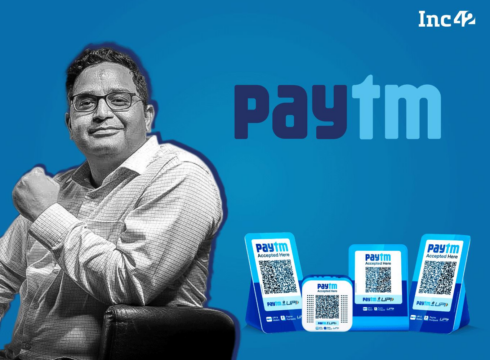The National Payments Corporation of India is reviewing Paytm's application to become a third-party payment app
The transition is expected to be seamless and gradual, with the “@paytm” handle being retained
The development comes as the deadline inches closer for implementation of the business restrictions imposed by the RBI on Paytm Payments Bank
Inc42 Daily Brief
Stay Ahead With Daily News & Analysis on India’s Tech & Startup Economy
Paytm’s parent entity One 97 Communications may look for a partnership with major banks like Yes Bank, Axis Bank, HDFC Bank and State Bank of India to settle Unified Payments Interface (UPI) transactions upon acquiring the third-party app provider (TPAP) license.
The transition is expected to be seamless and gradual, with the “@paytm” handle being retained. However, instead of linking to Paytm Payments Bank (PPBL), these handles will redirect to one of the four banks for settlement, as per TOI’s report, citing bankers close to the matter.
The @Paytm UPI handle, which was issued by the payment bank to its customers through the Paytm app, might change after March 15, the report said.
Paytm which holds a 49% stake in PPBL is orchestrating this transition.
“They will be issued fresh handles from the back-end and eventually customers will be migrated to each of the four banks in such a way that there is no extra pressure on any one entity,” the report added.
The development comes as the deadline inches closer for implementation of the business restrictions imposed by the RBI on Paytm Payments Bank.
“We are actively engaging with NPCI on our TPAP status and will promptly notify the exchanges once approvals are received and bank partnerships are established. As a publicly-listed company, we are bound by regulations that prevent us from disclosing timelines and partner bank details before official announcements through stock exchanges,” the report said.
This development follows the State Bank of India’s recent partnership with the fintech major for consumer UPI payments.
Earlier, Paytm’s UPI services were powered by Paytm Payments Bank Limited (PPBL). However, after regulatory action by the RBI, Paytm has been seeking partnerships to operate as a third-party application provider (TPAP), akin to competitors like PhonePe and Google Pay.
The National Payments Corporation of India (NPCI) is expected to grant TPAP license to One97 Communications, the parent company of Paytm, by March 15. Reportedly NPCI has completed most of the TPAP checks for Paytm. With this license, the fintech giant can continue offering Unified Payments Interface (UPI) services to its app users.
Bankers explained that the Paytm handle might be renamed to provide distinct identifiers for NPCI to route settlements to the correct bank. The UPI switch in the back-end facilitates these transactions.
On February 20, Paytm moved its nodal accounts to Axis Bank, aiding the settlement of UPI payments from consumers to merchants via QR codes.
Regarding merchant payments, a Paytm spokesperson told ET, “We would like to inform you merchants were onboarded by OCL, with PPBL serving as the PSP. These merchants will continue to remain with OCL, regardless of any changes in banking partnerships.”
Industry insiders informed ET that banks are poised to earn from the float income generated by daily transactions processed by Paytm as an application.
Meanwhile, shares of Paytm’s parent entity One97 Communications extended decline on Thursday (March 14), dropping over 4% ahead of the March 15 deadline.
Besides, National Highways Authority of India (NHAI) asking Paytm FASTag users to procure a new FASTag from another bank before March 15 to ensure a smooth travel experience and avoid inconvenience at toll plazas.
Note: We at Inc42 take our ethics very seriously. More information about it can be found here.


